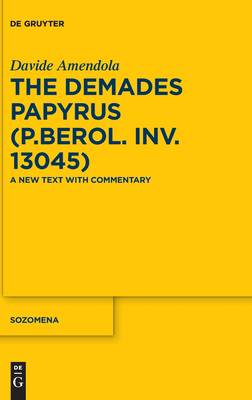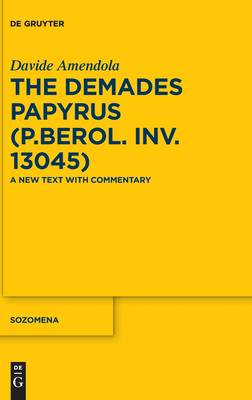
Bedankt voor het vertrouwen het afgelopen jaar! Om jou te bedanken bieden we GRATIS verzending (in België) aan op alles gedurende de hele maand januari.
- Afhalen na 1 uur in een winkel met voorraad
- In januari gratis thuislevering in België
- Ruim aanbod met 7 miljoen producten
Bedankt voor het vertrouwen het afgelopen jaar! Om jou te bedanken bieden we GRATIS verzending (in België) aan op alles gedurende de hele maand januari.
- Afhalen na 1 uur in een winkel met voorraad
- In januari gratis thuislevering in België
- Ruim aanbod met 7 miljoen producten
Zoeken
€ 256,45
+ 512 punten
Omschrijving
Despite the significance of its contents, the so-called Demades papyrus (P.Berol. inv. 13045) has received scarce scholarly attention since the 1923 editio princeps by Karl Kunst. This unique late second-century BCE document of almost 430 lines was found in the Egyptian chora, but it is supposed to have been written in Alexandria, where it probably served as a textbook for the highest level of rhetorical education. Besides shedding new light on its find circumstances and physical aspects, the volume offers a full re-edition and commentary of the two adespota texts contained in it, namely a eulogy of the Lagid monarchy and a historical work consisting of a dialogue between Demades and his prosecutor in the trial of 319 BCE at the court of Pella. The aim of the accompanying introduction is to address the question of the origin, nature and purpose of such fragments and of the collection itself, as well as to show to what extent the papyrus contributes to a better understanding of some of the main historical events of the early Hellenistic period. This book is thus meant to fill a significant gap in Classical scholarship, all the more so as a close investigation of most of the topics dealt with therein has hitherto been lacking.
Specificaties
Betrokkenen
- Auteur(s):
- Uitgeverij:
Inhoud
- Aantal bladzijden:
- 612
- Taal:
- Engels
- Reeks:
- Reeksnummer:
- nr. 17
Eigenschappen
- Productcode (EAN):
- 9783110600919
- Verschijningsdatum:
- 3/10/2022
- Uitvoering:
- Hardcover
- Formaat:
- Genaaid
- Afmetingen:
- 157 mm x 234 mm
- Gewicht:
- 1156 g

Alleen bij Standaard Boekhandel
+ 512 punten op je klantenkaart van Standaard Boekhandel
Beoordelingen
We publiceren alleen reviews die voldoen aan de voorwaarden voor reviews. Bekijk onze voorwaarden voor reviews.









